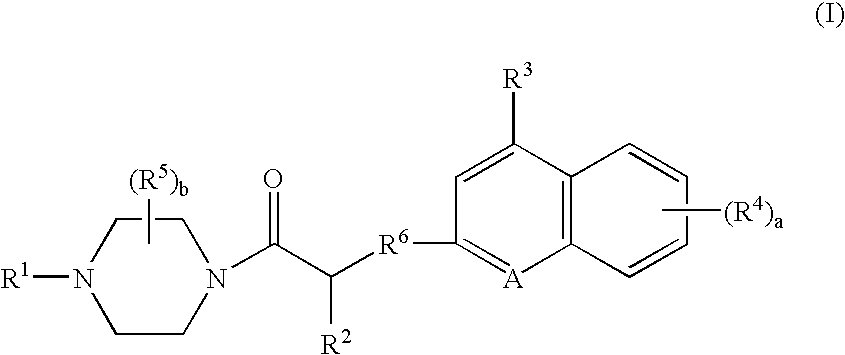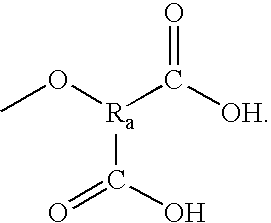Platelet adenosine diphosphate receptor antagonists
a technology of adenosine diphosphate and platelet, which is applied in the direction of drug composition, heterocyclic compound active ingredients, drug compositions, etc., can solve the problem that current oral platelet inhibitors are only modestly effective in preventing thrombotic complications in patients with underlying vascular diseas
- Summary
- Abstract
- Description
- Claims
- Application Information
AI Technical Summary
Benefits of technology
Problems solved by technology
Method used
Image
Examples
preparation 1
Compounds of Formula (D)
A. To a solution of N-carbobenzyloxy-L-glutamic acid gamma t-butyl ester (24.4 g, 72.3 mmol) in tetrahydrofuran (“THF”) (400 mL) and CH2Cl2 (100 mL) was added 1-hydroxybenzotriazole (“HOBT”) (10.7 g, 79.5 mmol) and 1-(3-dimethylaminopropyl)-3-ethylcarbodiimide (“EDCl”) (15.3 g, 79.5 mmol). After 5 minutes, 1-ethoxycarbonylpiperazine (11.7 mL, 79.5 mmol) was added and the reaction was stirred overnight. The reaction mixture was evaporated in vacuo to afford an oil, which was dissolved in ethyl acetate, and washed with saturated NaHCO3, 1M HaHSO4 and brine. The organic layer was evaporated in vacuo to 4-ethoxycarbonyl-1-(1-amino-3-(1,1-dimethylethoxycarbonyl)propyl)carbonylpiperazine (40.7 g), as an oil that was used without further purification. To 4-ethoxycarbonyl-1-(1-(benzyloxycarbonyl)amino-3-(1,1-dimethylethoxycarbonyl)propyl)carbonylpiperazine in MeOH (100 mL) was added 10% Pd / C (1 g) and the mixture was shaken under 50 psi H2 overnight. The reaction w...
preparation 2
Compounds of Formula (G)
A. To a solution of m-toludine (20.0 g, 0.186 mol) in methanol (300 mL), dimethyl acetylenedicarboxylate (26.42 g, 0.186 mol) was added drop-wise and the reaction mixture was stirred at ambient temperature for 30 minutes. The solvent was removed by evaporation and the residue was added to stirred diphenyl ether (150 ml), which has been preheated to 250° C. After 30 minutes, the mixture was cooled to ambient temperture and the resulting precipitate was collected and washed with hot petroleum ether (1.5 L) to give a mixture (27.0 g) of 5-methyl-4-hydroxy-2-methoxycarbonylquinoline and 7-methyl-4-hydroxy-2-methoxycarbonylquinoline. The mixture was dissolved in boiling methanol (1.3 L) and kept at ambient temperature for two days to afford (6.45 g, 16%) of 7-methyl-4-hydroxy-2-methoxycarbonylquinoline, NMR (DMSO-d6) 2.40 (s, 3), 3.92 (s, 3), 6.56 (s, 1), 7.16 (d, 1), 7.68 (s, 1), 7.94 (d, 1) ppm.
B. In a similar manner, other compounds of formula (G) were prep...
preparation 3
Compounds of Formula (H)
A. 7-methyl-4-hydroxy-2-methoxycarbonylquinoline (6.45 g, 30.14 mmol) was suspended in MeOH (150 mL) and water (100 mL), and LiOH (3.08 g, 75.5 mmol) was added and stirred at ambient temperature for 2 hours. The methanol was evaporated in vacuo and residue was crystallized by addition of 2N hydrochloric acid. The resulting solid was filtered, washed with water and dried to afford 7-methyl-4-hydroxy-2-carboxyquinoline (6.0 g, 98%), NMR (DMSO-d6) 2.40 (s, 3), 6.68 (s, 1), 7.22 (d, 1), 7.68 (s, 1), 7.96 (d, 1).
B. In a similar manner, the following compounds of formula (H) were prepared: 8-methoxy-4-hydroxy-2-carboxyquinoline; 5-amino-4-hydroxy-2-carboxyquinoline; 5-nitro-4-hydroxy-2-carboxyquinoline; 5-carboxymethylamino-4-hydroxy-2-carboxyquinoline; 7-chloro-4-hydroxy-2-carboxyquinoline; 5-di(acetyl)amino-4-hydroxy-2-carboxyquinoline; 5-acetylamino-4-hydroxy-2-carboxyquinoline; 5,7-dichloro-4-hydroxy-2-carboxyquinoline; 6-chloro-4-hydroxy-2-carboxy...
PUM
 Login to View More
Login to View More Abstract
Description
Claims
Application Information
 Login to View More
Login to View More - R&D
- Intellectual Property
- Life Sciences
- Materials
- Tech Scout
- Unparalleled Data Quality
- Higher Quality Content
- 60% Fewer Hallucinations
Browse by: Latest US Patents, China's latest patents, Technical Efficacy Thesaurus, Application Domain, Technology Topic, Popular Technical Reports.
© 2025 PatSnap. All rights reserved.Legal|Privacy policy|Modern Slavery Act Transparency Statement|Sitemap|About US| Contact US: help@patsnap.com



